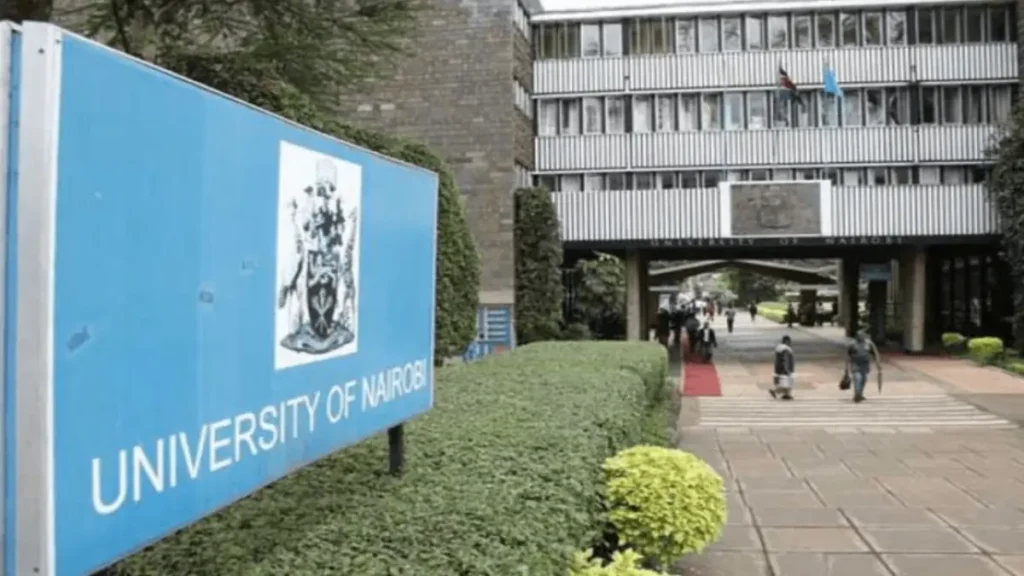The Ethics and Anti-Corruption Commission (EACC) has launched an investigation into the University of Nairobi (UON). The probe follows the university’s decision to hire Brian Ouma four months ago as the Chief Operating Officer despite warnings about unverified credentials.
According to recent reports, UON proceeded with the high-profile appointment even after receiving explicit caution from the anti-corruption watchdog about the candidate’s qualifications.

University of Nairobi Main Campus In Nairobi
A month ago, the watchdog questioned both the legitimacy of the appointment and the creation of new positions within the institution, insisting that Ouma’s bachelor’s Education certificate from Pontifical Abaniana in Rome, Italy is unrecognized as confirmed by the University Commission.
The EACC has expressed serious concerns about the university’s hiring process and now wants the decision rescinded.
Sources familiar with the matter reveal that the anti-graft agency had earlier flagged issues. They specifically highlighted problems with verifying the appointee’s academic and professional credentials.
Despite these warnings, UON’s administration proceeded with the appointment. This decision has now drawn intense scrutiny from the EACC and education stakeholders.
The controversy has raised questions about the university’s hiring protocols. It has also sparked debate about compliance with public service recruitment guidelines.
Legal experts point out that the appointment may violate several regulations. These include laws governing public institutions and educational standards in Kenya.
The EACC has particularly criticised how the position was created. They question whether proper procedures were followed in establishing the role of Chief Operating Officer.
University officials have yet to provide a detailed response to these allegations. Their silence has fueled further speculation about the circumstances surrounding the appointment.
Education sector observers note that this incident reflects broader concerns. They point to issues of transparency and accountability in university administration.
The anti-corruption body has indicated it will conduct a thorough investigation. They aim to examine all aspects of the hiring process and position creation.
This development comes at a crucial time for Kenya’s higher education sector. Many institutions are under pressure to maintain high standards of governance and transparency.
The EACC’s intervention highlights the growing scrutiny of public institutions. It demonstrates increased efforts to ensure compliance with ethics and anti-corruption measures.
Stakeholders in the education sector have called for immediate action. They urge the university to address these serious allegations promptly.
Student leaders at UON have also voiced their concerns. They demand transparency regarding the appointment process and its implications for university operations.
The controversy has potential implications for the university’s reputation. It raises questions about the institution’s commitment to maintaining high administrative standards.
Education experts warn that such incidents could affect public confidence. They stress the importance of following proper verification procedures in senior appointments.
The EACC has indicated it may recommend corrective measures. These could include reviewing the appointment and strengthening hiring protocols.
University staff members have expressed mixed reactions to the situation. Some worry about the impact on the institution’s operational efficiency and reputation.
The case has drawn attention to the need for stricter verification processes. It emphasises the importance of thorough background checks for senior positions.
Higher education regulators are closely monitoring the situation. They may consider implementing additional oversight measures for university appointments.
The outcome of this investigation could set important precedents. It may influence future hiring practices in Kenya’s public universities.
As the probe continues, questions remain about potential consequences. These could affect both the individual appointed and the university administration.
The situation highlights the complex relationship between universities and oversight bodies. It demonstrates the challenges of maintaining administrative integrity in higher education.
All eyes are now on how the university will respond to these challenges. The resolution of this case could shape future governance practices in Kenya’s education sector.



















